Impoverished Iranians Turn To Rented Car Parts To Pass Inspections
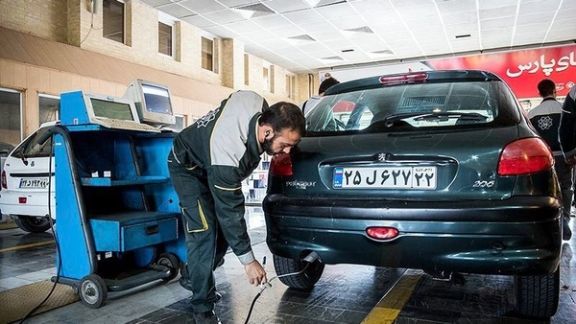
Iranians, unable to afford proper repairs, are resorting to renting car parts to secure technical inspection certificates, putting citizens' lives at risk.

Iranians, unable to afford proper repairs, are resorting to renting car parts to secure technical inspection certificates, putting citizens' lives at risk.
Shadi Maleki, the CEO of the Technical Inspection Headquarters of Tehran, speaking to the ISNA news agency, highlighted a growing issue where some vehicle owners are using rental parts, particularly catalytic converters and tires, to pass mandatory technical inspections.
Catalytic converters, crucial for reducing air pollution by purifying toxic gases from fuel combustion, have become mandatory in inspections. With most of Iran’s cars unroadworthy, it has bred a black market for parts to help ensure they pass under new regulations.
Maleki explained that the absence of the catalytic converter's serial number on vehicle cards makes it challenging to identify rental parts during inspections.
The situation is exacerbated by economic challenges in Iran where people cannot afford to upgrade their cars. This has been exacerbated as drivers faced a recent 30% increase in insurance premiums.
Furthermore, recent reports on October 14 revealed that the Ministry of Industry has approved a 20% increase in the price of car tires, adding to the financial burden on vehicle owners.
A decade-long lack of economic growth, coupled with international sanctions impacting oil export revenues, has strained the country's financial stability.
The situation raises concerns not only about the safety of vehicles on the road but also underscores broader economic challenges that Iranians are grappling with. High inflation rates, increasing poverty levels, and the pressing issues of road accidents and pollution further compound the complexity of the situation.

The Iranian regime continues its crackdown on dissidents, targeting women’s rights, labor and union activists, environmentalists, and religious minorities in recent weeks.
In the past week alone, there have been reports of the arrests of two female former political prisoners in Tehran, two female environmental activists and journalists as well as two female writers, and a female animals rights activist in Rasht, two male citizens in Izeh who participated in the anniversary ceremonies for two of last year’s protest victims – nine-year-old Kian Pir-Falak and sixteen-year-old Milad Saeedianjou – as well as the latter’s sister in the same city and several others elsewhere.
Security forces who raided the home of female journalist and former political prisoner Shaghayegh Moradi in Tehran on Monday morning seized some of her personal belongings and took her with them to her mother’s house to search the premises. It is not clear which security body is responsible for the arrest and where she is being kept.
Mahnaz Tarrah, former political prisoner, however, was violently arrested on the street and taken to a court stationed at Evin Prison.
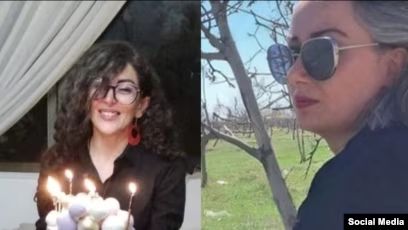
Farzin Rezaei-Roshan, also a former political prisoner, who was with Tarrah at the time of her arrest said in a video he released on social media that he was violently assaulted by the over a dozen agents who arrested his friend.
Rezaei-Roshan who is seen in the video in bloodied clothes says the agents used tasers and broke his head before taking his friend away.
In Rasht, capital of the northern province of Gilan, writer Rozita Rajaei was arrested Saturday and journalists Nasim Tavafzadeh and Helaleh Nategheh were arrested two days later. Both journalists had carried out research and written extensively about waste management, a big environmental problem in the region.
Like most other cases, there is very little information on these arrests in Rasht, but writer Nina Golestani’s husband said in an Instagram post that his wife was arrested by the Revolutionary Guards’ intelligence organization on her way home from shopping.
Due to censorship regulations, the mainstream media in Iran do not report on the majority of dissidents’ and activists’ arrests, which often involve unnecessary violence and maltreatment as well as confiscation of computers and mobile phones of not only the person being arrested, but of all other members of the family.
Information including reason for arrest and place of detention is often withheld even from the families of detainees by the authorities.
Social media users, however, actively inform the public of the arrests the regime strives to hide from the public and its human rights violations.
Pressure has also been high on Sunnis and followers of the Baha’i and Yarsan (Ahl-i Haqq) faiths that the regime does not recognize and considers as heretical unlike Christianity, Judaism and Zoroastrianism which have legal status in the Constitution.
The homes of the followers of the Baha’i faith, the largest non-Muslim religious minority in Iran, who have been persecuted since the Islamic Revolution of 1979 were raided in these cities by armed security agents last week with at least 19 people arrested and their personal belongings including electronic devices impounded.
The recent arrests have raised the number of Bahai’s arrested in the past month to at least 32 all of whom are still in prison.
The four members of the mystical Yarsan faith’s advisory council arrested in Kermanshah Province on Friday were reportedly freed after a few hours of interrogation but there is very little information on a Sunni cleric Abdulhakim Shahbakhsh who was arrested by security forces in Zahedan on November 8.
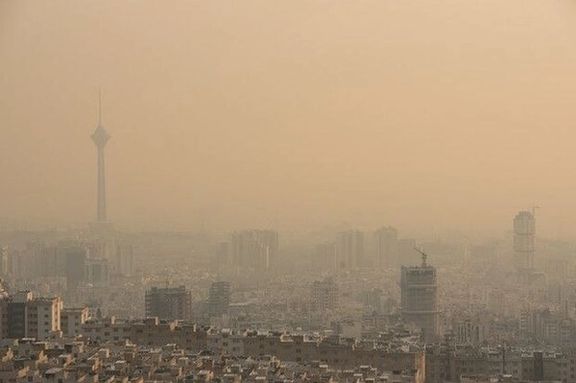
The Iranian Meteorological Organization has warned of worsening air pollution in the nation's five major cities with several schools moving to online learning.
The air quality in five cities, Tehran, Karaj, Arak, and Esfahan (Isfahan), has been put in place until Thursday, signifying a level of air quality deemed "very unhealthy."
Mehdi Pirhadi, a member of parliament, expressed concern about the deterioration of air quality and the rising concentration of pollutants. He highlighted that the number of polluted days in major cities this year has seen a notable increase compared to the previous year.
Pirhadi underscored the critical issues hindering effective response measures, including the lack of financial resources, inadequate supervision, and the low priority given to air pollution by officials. He emphasized that “a budget ranging from one to two billion dollars annually over a four-year plan is essential to address the air pollution crisis, but unfortunately, this matter is not receiving sufficient attention in budget planning.”
In response to the accumulating pollutants, the Emergency Air Pollution Situation Committee of Tehran has mandated that one-third of employees across all executive bodies will work remotely on Thursday.
In Isfahan, the Emergency Air Pollution Committee decided to extend school closures for the third day this week. The air quality in Isfahan reached the red level on Tuesday, prompting the committee to declare the closure of higher education centers too.
The escalating air pollution issue in Iran is further exacerbated by the country's heavy reliance on fossil fuels. Experts say pollution sources have surged in recent years, with a staggering 94% of the country's energy being derived from fossil fuels.
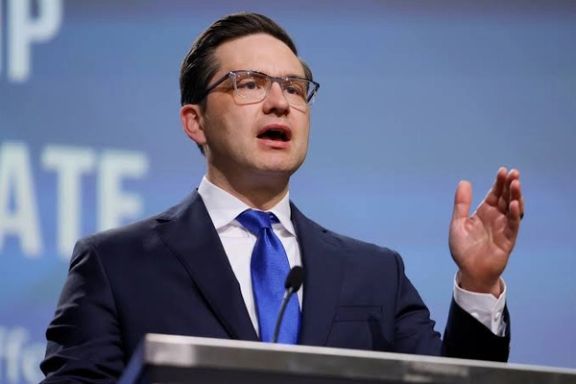
The Canadian opposition leader has called for immediate action against the Iranian regime, following revelations detailing its interference in Canada.
The report released by the Canadian outlet Global News focused on the ongoing threat against Iranian dissidents given the number of regime insiders operating in Canada.
Pierre Poilievre called the immense scope of the problem “shocking” and the number of agents mentioned in the report, which is approximately 700, “staggering”.
“To think that we might have terrorist-linked Iranian regime thugs operating with impunity, spending stolen money and intimidating Canadian Jews and Iranians is appalling,” he told Global News. The situation necessitates “immediate action to kick them out of this country,” the prime ministerial candidate added.
The Conservative leader had already pledged that his administration would list Iran's Islamic Revolutionary Guard Corps (IRGC) as a terrorist organization in Canada if elected, along with the US which took the move in 2019.
Among the non-governing parties in the House of Commons, Pierre Poilievre's Official Opposition Party has the most seats. Polls and projections indicate that the Conservative party will lead the upcoming federal election, for the 45th Canadian Parliament, scheduled for October 20, 2025.
Currently, Canada has expanded targeted sanctions against some IRGC members and amended its Magnitsky legislation in order to allow it to go after individuals accused of human rights abuses and corruption, but the opposition says that these measures do not suffice.
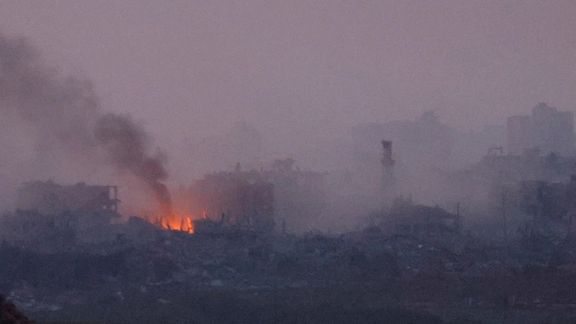
An ultraconservative lawmaker in Iran has initiated an impeachment against the foreign minister citing inaction by the diplomatic service before the Saudi authorities.
In a document disclosed by Tehran's Jamaran news website, Mahmoud Abbaszadeh-Meshkini criticized the "weakness in playing a central and effective role" in addressing the Gaza conflict. He expressed the expectation that Iran’s Foreign Ministry, being the "most powerful country in the resistance axis," should have convened an urgent meeting with members of the Organization of the Islamic Cooperation (OIC) in Tehran.
Taking issue with the performance of Foreign Minister Hossein Amir-Abdollahian, Meshkini, who sits on the Parliament’s National Security and Foreign Policy Committee, asked: "How is it that until recently, the goal was to eliminate the Zionist regime, but now the discourse has shifted."
It appears that he is referring to the fact that Iran has recently twice accepted the two-state solution.
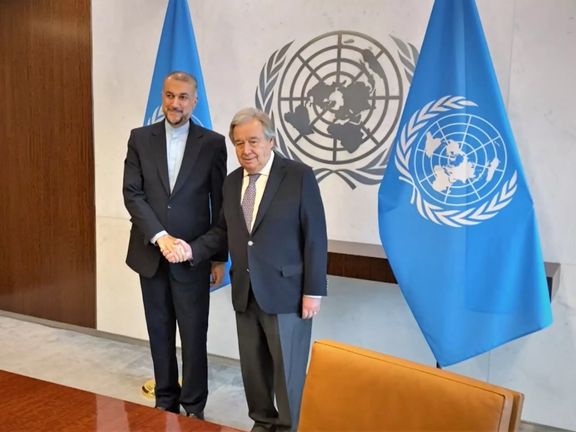
As part of the two-state solution to the Israeli-Palestinian conflict, Palestine would be an independent state alongside Israel. There are still disputes over the border between the two states, and the Palestinian and Arab leaderships are demanding that Israel withdraw from territories it occupied in 1967, which is rejected by Israel.
Iran's public position, however, has always been to annihilate Israel as a state, rejecting a two-state agreement.
On October 27, the UN General Assembly approved a resolution calling for a "humanitarian truce" in Gaza. Back then, Iranian hardliner outlets attempted to justify Iran's vote in favor of that resolution, which also advocated a two-state solution.
“Did Iran vote for the two-state solution? Although some have expressed doubts regarding Iran's position towards Palestine and the formation of an independent Palestinian state following the recent resolution of the General Assembly, Iran's position remains strong,” Fars News wrote last week.
The paper then cited the Permanent Representative of Iran to the United Nations as saying that if they hadn’t voted, it would have been “playing into the hands of the Zionist regime”.
“The Arab League presented this resolution to the United Nations General Assembly, but it was never discussed,” he explained according to Fars News.
More recently, in a summit of Islamic and Arab states in Riyadh, in which Iranian President Ebrahim Raisi also participated, a statement was released that also referred to the two-state solution.
Iran’s Foreign Ministry spokesman Nasser Kanaani said Tehran had always expressed “reservations” in the past about some of the provisions approved during the Riyadh summit.
Hardliners in the regime still call for the destruction of Israel and claim they are eager to go and fight in Gaza, while the top leadership has been cautious so far, avoiding any direct involvement.
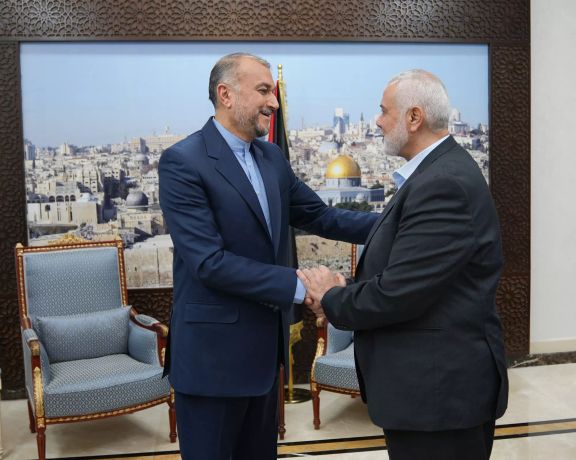
Referring to the war in Gaza, General Mohammad-Reza Naghdi, a deputy commander of the Islamic Revolution Guard Corps, IRGC, said on Tuesday that while it’s true they have not sent any troops to Gaza, but that does not imply that nothing is being done.
“We eagerly await the order to deploy to Gaza,” he said rhetorically.
As more of a symbolic gesture, 150 members of the parliament have volunteered for deployment to Gaza, and the regime claims to have registered 6 million volunteers ready to join the war in Gaza.
The move to impeach Amir-Abdollahian resembles another attempt at posturing by hardliners.
With the next parliamentary election around the corner, this could also be a sign that hardliners such as Meshkini, who is sanctioned by the EU and UK, are appealing to extremists for their votes.
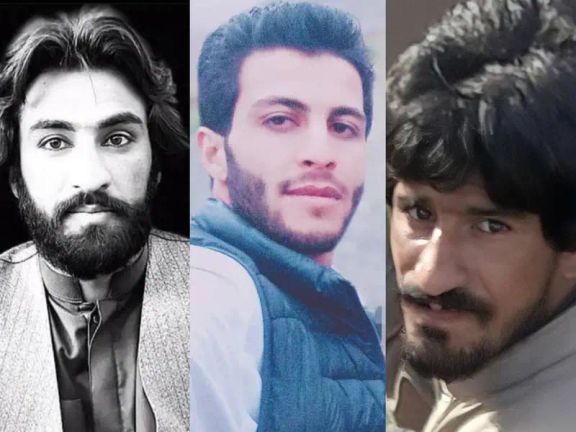
Three political prisoners were executed on Tuesday at Zahedan prison in Iran’s southeastern Sistan-Baluchistan province, which has a majority Sunni population.
Mizan News Agency affiliated with Iran’s notorious Judiciary made the announcement, as it has executed more than 100 inmates in the past one month.
The condemned political prisoners were charged with alleged "membership and collaboration with Jaish ul-Adl, receiving military training, transporting and concealing bomb-making materials, as well as participating in two bombing operations in Zahedan, an unsuccessful bombing in Zabol county, and two bombing operations in Zahedan's police station."
Jaish ul-Adl, a Sunni Islamist armed group, operates predominantly in southeastern Iran, where a significant Sunni Baluchi population resides, and the border with Pakistan is porous.
The detainees, apprehended by security forces in September 2020, underwent months of interrogation before being transferred to Zahedan prison.
Last Saturday, another political prisoner was also executed after enduring 12 years of imprisonment in the same facility.
Jaish ul-Adl promptly responded to the executions, characterizing them as "a sign of the weakness and incompetence of the regime of the Supreme Leader in confronting the movement of the people of Baluchestan for the realization of their legitimate rights," as stated on its Telegram channel and website.
In a parallel development, the Oslo-based Human Rights Organization of Iran released a report on Tuesday, documenting 114 executions in the country since the commencement of the conflict in Gaza. Of these, 24 were Baluch citizens, five of whom were sentenced to death for collaborating with armed groups opposing the Islamic Republic.
The 2022 execution statistics for Iran reveal that the Sistan-Baluchestan holds the highest per capita execution rate in the country, with 39 executions per one million people.